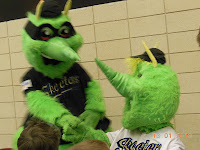It mostly does not make any difference how this opera is presented.
Mozart's music continually lures and enchants.
Even if, as led by Trevor Pinnock, the orchestra started slow to build to almost Wagnerian sounds often drowning out some singers.
Even if, the set by Oberle, designed with longevity in mind (lol) is used again and again, with lots of simple, clean lines and in neutral colors, could be used for numerous operas, not only for Mozart's. Goeran Jaervefelt's original directions were more or less faithfully executed by Harry Silverstein
Even if, as was the case, a smallish voiced singer however cute, did not do justice to the role.
Overall, the cast was led with stunning force by the Donna Anna of Rachel Willis Sorensen (in a video clip from Tannhaueser), a HGO Studio alumna, whose patient lover Don Ottavio sung with precise enunciation and clarity by Joel Prieto (photo above by Felix Sanchez).
 |
| PhotoCredit Felix Sanchez HGO website |
Equally exciting, and as promised (Showboat's Joe:!), was
the stentorian deep voice of Morris Robinson (right as her slain father, the Commendatore ,
And the resolute, and easily heard over the loudest orchestra, Leporello by Kyle Ketelsen.
Veronika Dzhioeva as Donna Elvira sang creditably, but with somewhat less fervor than the Donna Elvira of the past, Ana Maria Martinez, although in looks they could be twins.
Malin Christensson, a pipingly voiced pretty little Zerlina was frequently inaudible over the crashing sounds of the orchestra, alas. What was heard though, did sound sweet.
Masetto, sung with a warm bass bariton by former HGO Studio alumnus Michael Sumuel, provided some comic relief.
IMO, the best chosen singer for the role of the dissipated womanizer Don Giovanni, was undoubtedly Viennese born Adrian Eroed (right) who embodied the dissolute aristocrat perfectly.
 |
| Photo Credit Felix Sanchez HGO website |
This image of the Don has fascinated audiences, singers,
directors for centuries. We are appalled, and yet attracted to a scoundrel with panache! Aren't we?
And Mozart wrote music, that is so integral to this image. The Don has fewer soli than the rest and yet dominates.
As much as we like the idea of an adoring lover (Ottavio) in principal, we perhaps feel he is a wimp opposite the forceful and (maybe a bit) homophobic Donna Anna.
The one we do feel sorriest for, is Donna Elvira who stays optimistic till almost the end. A woman scorned but still infatuated.
The moralizing end is so ambiguous, that IMO, it should be left off!
Maybe it was written to warn us not to admire the DON with his evil {?}ways, too much!
Hmm, if that was the reason, it does not quite make it.
We still are on his side, nevertheless ;-)!
















































